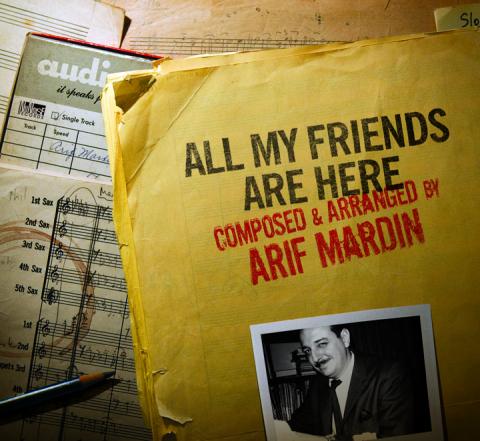Beyond the Hits

Arif Mardin '61 and Joe Mardin '85
For the past few years, Joe Mardin ’85 has poured all his energy into two projects that document the legacy of his late father, Arif Mardin, as one of the all-time great pop-record producers. The first is Arif’s final recording, All My Friends Are Here, which was coproduced by the father-and-son team. It features new renditions of 12 of Arif’s songs that span 50 years between 1955 and 2006 and spotlight dozens of instrumentalists and superstar singers. The project is home turf for Joe, who completed the work after his father succumbed to pancreatic cancer on June 25, 2006.
The second project, the film The Greatest Ears in Town, was less familiar turf to the younger Mardin (who codirected it with Doug Biro). It’s named after the CD’s opening track, which was cowritten and sung by Bette Midler and chronicles Arif’s long career and the making of

The film combines footage of Arif’s last recording sessions in the spring of 2006 interspersed with photos, video, and interviews with top musical figures (including Aretha Franklin, Chaka Khan, and George Martin) as well as members of the Mardin family. It’s currently available for download on Amazon.com and, later this year, will be released as a DVD. Given the film’s subject, it’s not surprising that the reviews have been glowing and that the film has been nominated for a Grammy Award in the Best Long Form Video category.
Posthumous Tributes
Joe Mardin set aside work at his company NuNoise Records to pay homage to his father through these projects. “I really want people to understand more about Arif,” he says. “There was a lot there beyond the hit songs.” Arif wrote a considerable body of work that fell outside the pop realm, including jazz compositions, a string quartet, an opera, and more. To illuminate the lesser-known side of Arif’s musical personality, Joe is organizing all Arif’s pieces and hopes to publish them so others can perform them.
“He loved jazz and said he came to America hoping to be involved with jazz as a big-band arranger,” Joe says. “But the big-band era was really over by the time he finished Berklee. He tried to make a career back in Turkey, but it wasn’t working. So he came back to Berklee and started teaching. He liked being in America where there was a chance for something to happen. My mother deserves a lot of credit for believing in him and encouraging him to go to New York and try to do something more with his music.”
The film reveals that during those first years in New York, it wasn’t easy. Arif’s wife, Latife, supported him by working as a translator at the United Nations while he sought work. In 1963, Nesuhi Ertegun at Atlantic Records offered Arif a nonmusical administrative job at the label. Through Arif’s moonlighting as an arranger for King Curtis, Nesuhi and his brother, Ahmet, discovered Arif’s skills as an arranger. Arif soon became an indispensable part of Atlantic’s creative team. Ultimately, Arif’s arrangements and productions graced 50 million-selling albums for such artists as Barbra Streisand, Bette Midler, Norah Jones, and scores more.
A Wealth of Musical Influences
“My father loved jazz and bebop as well as heavy-duty 20th-century classical music,” Joe says. “He loved the music of Alban Berg, [Béla] Bartók, and [Igor] Stravinsky. The way he brought this variety and wealth of influences into pop music was really unique and makes him stand out from other producer-arrangers.”
In the film, Arif discusses the experience in 1966 when the Young Rascals’ “Good Lovin’” became his first number-one hit. With his typical understated humor, he confesses to thinking, “Maybe jazz would go to the back burner.”
The music on Arif’s final album showcases the depth and breadth of his musical personality. The harmonies and orchestrations are sophisticated and reveal Arif’s modern side. Many melodies have unusual chromatic turns, and the film shows vocalists including Chaka Khan, Norah Jones, and Carly Simon, describing the melodies as challenging to sing. “The melodies are not easy, but they sound deceptively simple,” Joe says.
Interestingly, Arif referred to the album as his “life’s work.” He revisited some of his early instrumental compositions and added lyrics to make them songs. “My dad had many pieces from every decade of his career,” Joe says, “and he wanted to put all of them together in one place.
“The oldest piece on the CD is ‘Longing for You,’ which he wrote in 1955 while still living in Istanbul. Norah Jones sings that one. ‘Chez Twang’ [featuring Dr. John] was a piece he wrote as a Berklee student. He originally titled it ‘Byarding’ for the late [jazz musician] Jaki Byard. ‘No Way Out,’ sung by [Canadian jazz vocalist and bassist] Nicki Parrott, is the newest piece and was written in his last couple of months.” In fact, Arif completed the string arrangement for “No Way Out” in his hospital bed the night before he passed away.
The album opener, “The Greatest Ears in Town,” was cowritten by Bette Midler and Marc Shaiman and chronicles Arif’s career in song and is the only piece on the disc not written by Arif. Midler suggested the concept, which both Joe and Arif embraced, turning it into “an extravaganza,” as Joe describes it, with cameo vocal appearances by Barry Gibb and Polygraph Lounge, humorous sound effects, and re-enacted dialogue between Midler and Arif that mirrors their conversations while working together on Midler’s albums.
Joe says that “So Many Nights,” sung by Danny O’Keefe, is one of his favorite tracks on the CD. “It captures the essence of my father’s musical personality,” he says. “The chord progression and the orchestral drama in that song are so Arif. When I hear [the song], it’s almost as if I can feel him in the room.”
Both the film and the album were labors of love, Joe says. But completing the CD was emotionally difficult following Arif’s passing. “It seemed like an injustice that he was denied the opportunity to finish this very personal statement,” Joe says. “It was hard to put the finishing touches on it. With each decision, [recording engineer] Michael O’Reilly and I were constantly asking each other, ‘What would Arif have done?’ I hope he would be happy with how we finished it.”
Later this year, Joe will resume his own writing and producing. He will compose an orchestral work commissioned by the Istanbul Philharmonic and release a CD of his original electronic music. Arif’s final album is currently available in United States, Europe, Japan, and Australia. Joe is working on arrangements for a limited theatrical release for the film and airings on TV. This tale of an immigrant coming to America and ultimately guiding the course of American popular music for five decades is a must-see. It’s a stunning take on the American dream.




